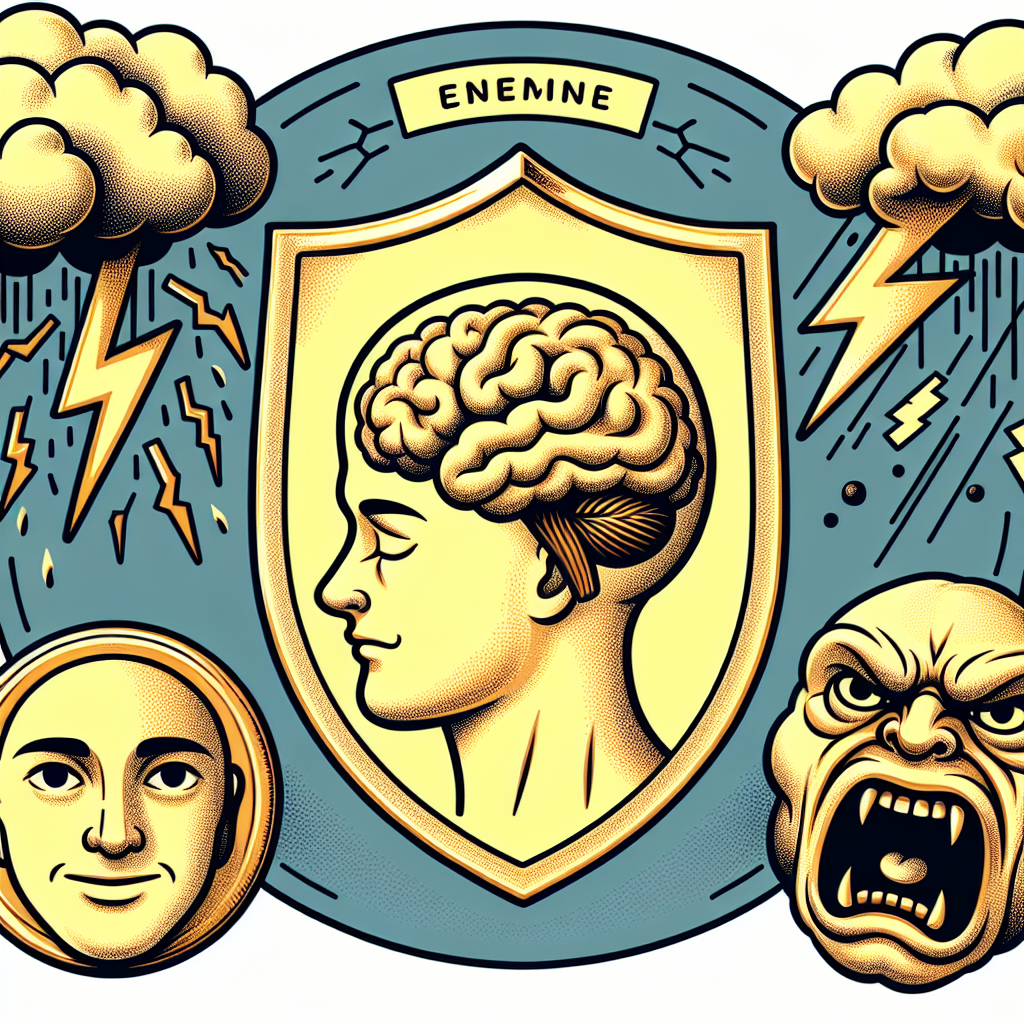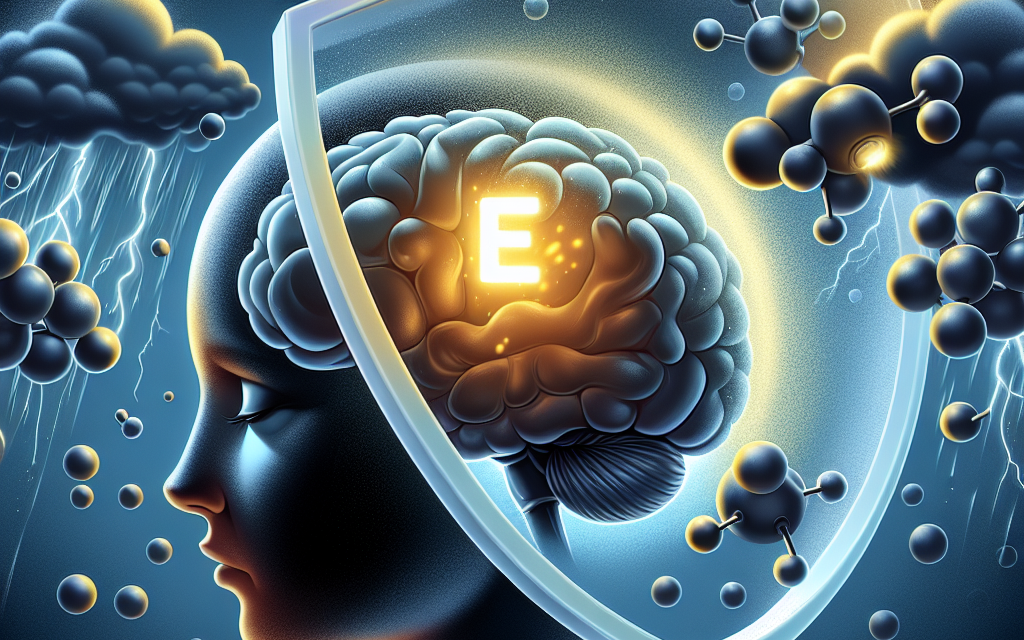The Role of Vitamin E in Shielding the Brain from Oxidative Stress and Anxiety

Vitamin E, a fat-soluble antioxidant, plays a crucial role in maintaining brain health by protecting it from oxidative stress and potentially alleviating anxiety. This article delves into the multifaceted role of Vitamin E, exploring its biochemical properties, its impact on oxidative stress, its potential in anxiety management, and the implications of Vitamin E deficiency. We will also examine current research and case studies to provide a comprehensive understanding of this essential nutrient.
Understanding Vitamin E: Biochemical Properties and Functions
Vitamin E is a group of eight fat-soluble compounds, including four tocopherols and four tocotrienols. Among these, alpha-tocopherol is the most biologically active form in humans. Its primary function is to act as an antioxidant, neutralizing free radicals and preventing oxidative damage to cells and tissues.
Free radicals are unstable molecules that can cause significant damage to cellular structures, including lipids, proteins, and DNA. The brain, with its high lipid content and oxygen consumption, is particularly vulnerable to oxidative stress. Vitamin E’s antioxidant properties help protect the brain from these harmful effects, maintaining cognitive function and overall brain health.
Beyond its antioxidant role, Vitamin E is involved in immune function, cell signaling, and gene expression. It also plays a part in inhibiting platelet aggregation, which can reduce the risk of blood clots and improve circulation, further supporting brain health.
- Antioxidant protection: Neutralizes free radicals and prevents oxidative damage.
- Immune support: Enhances immune function and response.
- Cell signaling: Participates in cellular communication processes.
- Gene expression: Influences the expression of certain genes related to cell growth and survival.
- Circulatory health: Inhibits platelet aggregation, reducing the risk of clots.
Understanding these biochemical properties is essential for appreciating how Vitamin E contributes to brain health and its potential role in managing anxiety.
Oxidative Stress and the Brain: The Protective Role of Vitamin E
Oxidative stress occurs when there is an imbalance between free radicals and antioxidants in the body. This imbalance can lead to cellular damage, contributing to the development of neurodegenerative diseases such as Alzheimer’s and Parkinson’s. The brain is particularly susceptible to oxidative stress due to its high metabolic rate and lipid-rich environment.
Vitamin E, as a potent antioxidant, helps mitigate oxidative stress by neutralizing free radicals and protecting neuronal cells from damage. Studies have shown that adequate levels of Vitamin E can reduce the risk of cognitive decline and improve brain function in older adults.
Research has demonstrated that Vitamin E supplementation can enhance cognitive performance and slow the progression of neurodegenerative diseases. For instance, a study published in the Journal of the American Medical Association found that high doses of Vitamin E slowed the progression of Alzheimer’s disease in patients with mild to moderate symptoms.
Moreover, Vitamin E’s role in protecting the brain extends to its ability to preserve the integrity of cell membranes. By preventing lipid peroxidation, Vitamin E maintains the structural and functional integrity of neuronal cells, supporting overall brain health.
- Neutralizes free radicals: Reduces oxidative damage to brain cells.
- Preserves cell membranes: Prevents lipid peroxidation and maintains cell integrity.
- Supports cognitive function: Enhances memory and cognitive performance.
- Slows neurodegeneration: Reduces the risk and progression of diseases like Alzheimer’s.
These protective effects highlight the importance of maintaining adequate Vitamin E levels for brain health and underscore its potential in preventing and managing neurodegenerative conditions.
Vitamin E and Anxiety: Exploring the Connection
Anxiety disorders are among the most common mental health conditions, affecting millions of people worldwide. While the exact cause of anxiety is complex and multifactorial, oxidative stress has been implicated as a contributing factor. The brain’s vulnerability to oxidative damage can exacerbate anxiety symptoms, making antioxidant support crucial.
Vitamin E’s antioxidant properties may help alleviate anxiety by reducing oxidative stress and inflammation in the brain. Research suggests that oxidative stress can lead to neuroinflammation, which is associated with anxiety and other mood disorders. By neutralizing free radicals, Vitamin E may help reduce neuroinflammation and improve mood regulation.
Several studies have explored the potential of Vitamin E in managing anxiety. For example, a study published in the journal “Nutrients” found that Vitamin E supplementation reduced anxiety-like behavior in animal models. The researchers concluded that Vitamin E’s antioxidant effects could modulate neurotransmitter systems involved in anxiety regulation.
Additionally, Vitamin E’s role in supporting overall brain health may indirectly contribute to anxiety management. By preserving cognitive function and reducing the risk of neurodegenerative diseases, Vitamin E may help maintain mental well-being and resilience against stressors.
- Reduces oxidative stress: Alleviates anxiety symptoms by neutralizing free radicals.
- Decreases neuroinflammation: Modulates inflammation linked to mood disorders.
- Supports neurotransmitter balance: Influences systems involved in anxiety regulation.
- Enhances mental resilience: Maintains cognitive function and overall brain health.
While more research is needed to fully understand the relationship between Vitamin E and anxiety, current evidence suggests that maintaining adequate Vitamin E levels may be beneficial for mental health.
Vitamin E Deficiency: Implications for Brain Health and Anxiety
Vitamin E deficiency is relatively rare but can have significant implications for brain health and anxiety. A lack of Vitamin E can lead to increased oxidative stress, resulting in cellular damage and impaired cognitive function. This deficiency can also exacerbate anxiety symptoms by contributing to neuroinflammation and neurotransmitter imbalances.
Populations at risk for Vitamin E deficiency include individuals with fat malabsorption disorders, such as cystic fibrosis or Crohn’s disease, and those with genetic conditions affecting Vitamin E metabolism. Additionally, low dietary intake of Vitamin E-rich foods can contribute to deficiency.
Symptoms of Vitamin E deficiency may include muscle weakness, vision problems, and impaired immune function. In severe cases, neurological symptoms such as ataxia and peripheral neuropathy can occur, highlighting the importance of adequate Vitamin E intake for nervous system health.
Addressing Vitamin E deficiency involves dietary modifications and, in some cases, supplementation. Foods rich in Vitamin E include nuts, seeds, vegetable oils, and green leafy vegetables. For individuals with malabsorption issues, healthcare providers may recommend Vitamin E supplements to ensure adequate intake.
- Increased oxidative stress: Leads to cellular damage and cognitive decline.
- Exacerbated anxiety symptoms: Contributes to neuroinflammation and neurotransmitter imbalances.
- At-risk populations: Includes individuals with malabsorption disorders and low dietary intake.
- Symptoms of deficiency: Muscle weakness, vision problems, and neurological issues.
- Dietary sources: Nuts, seeds, vegetable oils, and green leafy vegetables.
Understanding the implications of Vitamin E deficiency underscores the importance of maintaining adequate levels for brain health and anxiety management.
Current Research and Future Directions
Research on Vitamin E’s role in brain health and anxiety is ongoing, with studies exploring its potential therapeutic applications. Recent findings suggest that Vitamin E may have neuroprotective effects beyond its antioxidant properties, influencing gene expression and cellular signaling pathways involved in brain function.
One area of interest is the potential of Vitamin E in combination with other antioxidants or nutrients. For example, studies have investigated the synergistic effects of Vitamin E and Vitamin C in reducing oxidative stress and improving cognitive function. These findings suggest that a combination of antioxidants may offer enhanced neuroprotection.
Additionally, researchers are exploring the role of different forms of Vitamin E, such as tocotrienols, in brain health. Tocotrienols have unique properties that may offer additional benefits, including anti-inflammatory effects and the ability to cross the blood-brain barrier more effectively than tocopherols.
Future research may also focus on personalized nutrition approaches, considering individual genetic variations that affect Vitamin E metabolism and response. This personalized approach could optimize Vitamin E intake for brain health and anxiety management.
- Neuroprotective effects: Beyond antioxidant properties, influencing gene expression and signaling pathways.
- Synergistic combinations: Potential benefits of combining Vitamin E with other antioxidants or nutrients.
- Tocotrienols: Exploring unique properties and benefits for brain health.
- Personalized nutrition: Considering genetic variations in Vitamin E metabolism and response.
As research continues to uncover the complexities of Vitamin E’s role in brain health, it holds promise for developing targeted interventions for oxidative stress and anxiety-related conditions.
Conclusion
Vitamin E plays a vital role in protecting the brain from oxidative stress and potentially alleviating anxiety. Its antioxidant properties help neutralize free radicals, reduce neuroinflammation, and support overall brain health. While more research is needed to fully understand its therapeutic potential, current evidence suggests that maintaining adequate Vitamin E levels is crucial for cognitive function and mental well-being.
Addressing Vitamin E deficiency through dietary modifications or supplementation can help mitigate the risk of cognitive decline and anxiety symptoms. As research advances, personalized nutrition approaches and synergistic combinations with other nutrients may offer new avenues for optimizing brain health.
In summary, Vitamin E is an essential nutrient with significant implications for brain health and anxiety management. By understanding its role and ensuring adequate intake, individuals can support their mental well-being and resilience against oxidative stress.





